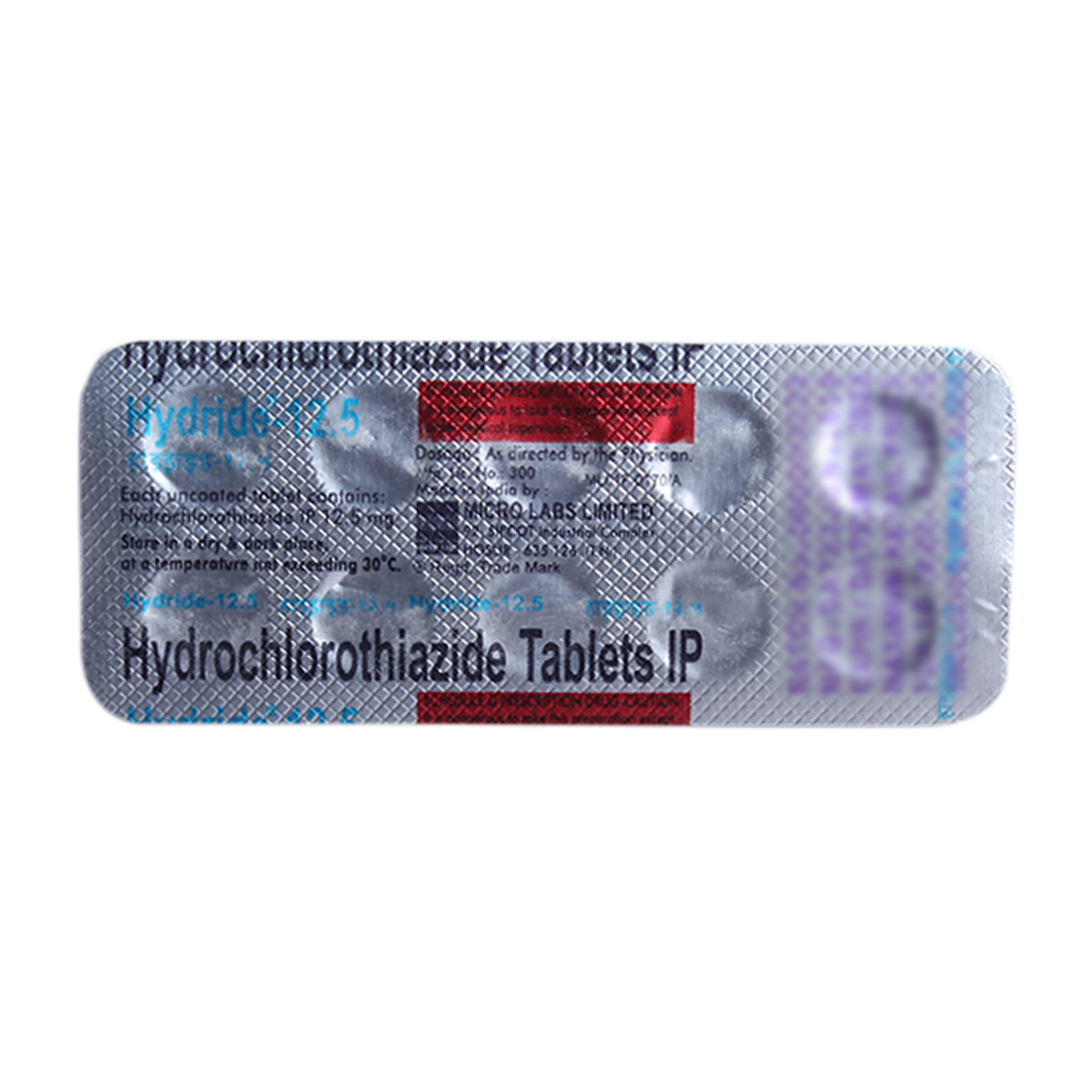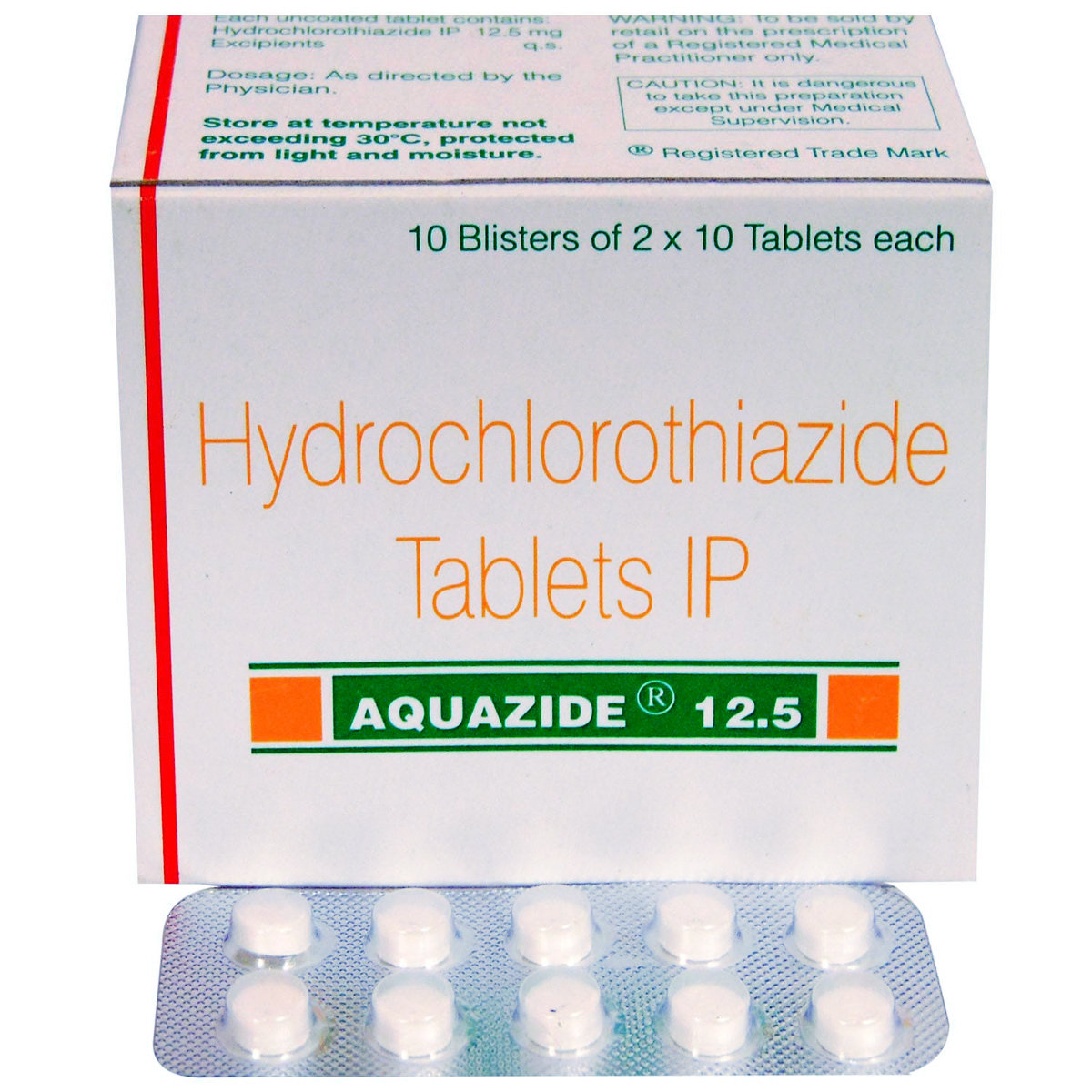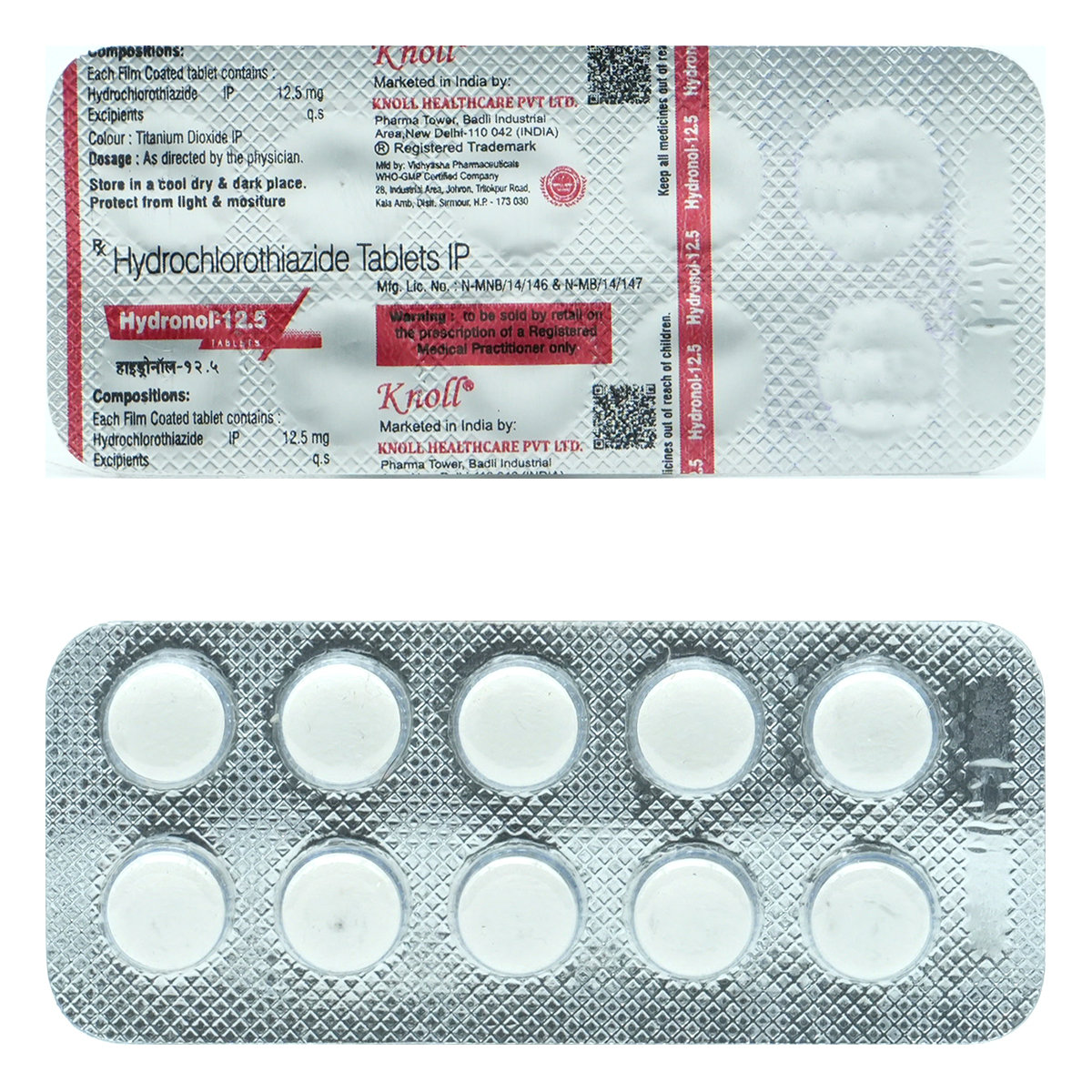THIAZIDE 12.5MG TABLET
MRP ₹10.3
(Inclusive of all Taxes)
₹1.2 Cashback (12%)
Provide Delivery Location
Online payment accepted
 Prescription drug
Prescription drugWhats That
Composition :
Manufacturer/Marketer :
Consume Type :
Expires on or after :
Return Policy :
About THIAZIDE 12.5MG TABLET
THIAZIDE 12.5MG TABLET belongs to a group of medicines called diuretics (which increase urine production). It is used to treat high blood pressure, heart failure and oedema (a build-up of fluid in the body). Diuretics are sometimes called 'water pills' because they make you urinate more. Besides this THIAZIDE 12.5MG TABLET is also sometimes used to help you urinate when your kidneys aren't working properly. High blood pressure or hypertension is a chronic condition in which the force exerted by the blood against the artery wall is high. The higher this blood pressure, the harder the heart has to pump. As a result, it leads to heart diseases, irregular heartbeat, and other complications. Oedema (swelling) may occur in case of high blood pressure where fluids of the body get trapped in the tissues of the hands, arms, feet, ankles, and legs.
THIAZIDE 12.5MG TABLET works by increasing the amount of urine that is passed out from the kidneys. It effectively reduces excess fluid levels in the body and treats oedema (swelling) associated with heart, liver, kidney, or lung disease. This reduces the workload on the heart and makes the heart more efficient at pumping blood throughout the body. Thus, it helps to lower high blood pressure, reducing the chances of heart attack or stroke.
You can take THIAZIDE 12.5MG TABLET with food or without food. It should be swallowed whole with a glass of water. Do not chew, bite, or break it. Your doctor will advise you on how often you take your tablets based on your medical condition. Sometimes, you may experience dehydration, headache, nausea, or dizziness. Most of these side effects of THIAZIDE 12.5MG TABLET do not require medical attention and gradually resolve over time. However, if the side effects are persistent, reach out to your doctor.
Try not to stop taking the THIAZIDE 12.5MG TABLET of your own. Let your doctor know about this, as it may cause a rise in blood pressure and can increase the risk of heart disease and stroke. Inform your doctor if you are suffering from kidney, liver, or heart disease. If you are pregnant or breastfeeding, please tell your doctor so that the dosage of THIAZIDE 12.5MG TABLET can be prescribed accordingly. Please tell your doctor if you are taking any other medicines or are allergic to THIAZIDE 12.5MG TABLET. Reducing the amount of table salt (sodium chloride) in your food often relieves the swelling of the body.
Uses of THIAZIDE 12.5MG TABLET
Directions for Use
Key Benefits
When you take THIAZIDE 12.5MG TABLET, the blood vessels in your body will be relaxed, which will help lower the blood pressure. Also, it relaxes the blood vessels and helps to improve the blood flow. It helps in losing out excess fluids from the body by increasing the production of urine. This reduces the workload on the heart and makes the heart more efficient at pumping blood throughout the body. Thus, it helps to lower high blood pressure, reducing the chances of heart attack or stroke. Besides, this relieves oedema and helps you carry out your daily activities more efficiently.
Storage
Drug Warnings
Before using THIAZIDE 12.5MG TABLET, tell your doctor if you have liver disease, kidney disease, eye problem (glaucoma), asthma, increased uric acid level (gout), diabetes, or allergic to antibiotics (like sulpha drugs or penicillin). THIAZIDE 12.5MG TABLET should not be given to the people allergic to THIAZIDE 12.5MG TABLET, have low blood pressure (less than 90 mm of Hg), or have had a heart attack, kidney disease, or liver disease. Besides this, it is contraindicated in low blood pressure (hypotension), cardiogenic shock (sudden stopping of blood flow to the heart), and aortic stenosis (heart valve problem). Inform your doctor if you are pregnant, suspect you are pregnant, plan to have a baby or if you are breastfeeding; your doctor will prescribe THIAZIDE 12.5MG TABLET only if the benefits outweigh the risk. Before taking the THIAZIDE 12.5MG TABLET, inform your doctor about your medical history and ongoing therapies to rule out any potential adverse effects or interactions.
Drug-Drug Interactions
Drug-Drug Interactions
Login/Sign Up
Taking Cisapride and Thiazide 12.5mg Tablet can increase the risk of an irregular heart rhythm which can be severe. The risk increases in patients with a history of heart illness or electrolyte imbalance.
How to manage the interaction:
Combining Cisapride and Thiazide 12.5mg Tablet together is generally avoided as it can possibly result in an interaction, it can be taken if advised by your doctor. However, if you experience any symptoms like dizziness, lightheadedness, fainting, or fast or pounding heartbeats, consult the doctor immediately. Do not stop using any medications without a doctor's advice.
Taking Dofetilide and Thiazide 12.5mg Tablet can increase the risk of an irregular heart rhythm which can be severe. The risk increases in patients with a history of heart illness or electrolyte imbalance.
How to manage the interaction:
Combining Dofetilide and Thiazide 12.5mg Tablet together is not recommended as it can possibly result in an interaction, it can be taken if advised by your doctor. However, if you experience any symptoms like sudden dizziness, lightheadedness, fainting, shortness of breath, chest pain or tightness, rapid heartbeat, or memory loss, contact your doctor immediately. Do not discontinue any medications without consulting a doctor.
Coadministration of Amiodarone together with Thiazide 12.5mg Tablet may raise the risk of an abnormal heart rhythm.
How to manage the interaction:
Even though Amiodarone and Thiazide 12.5mg Tablet interact, they can be used if prescribed by a doctor. If you have cardiac problems or electrolyte imbalances, you may be at greater risk. If you experience abrupt dizziness, lightheadedness, fainting, shortness of breath, or rapid heartbeat, Weakness, tiredness, drowsiness, confusion, painful muscle cramping, dizziness, nausea, or vomiting, get medical attention. Do not discontinue any medications without consulting a doctor.
The combined use of Tizanidine and Thiazide 12.5mg Tablet can have additive effects in lowering your blood pressure.
How to manage the interaction:
Taking Tizanidine and Thiazide 12.5mg Tablet together can possibly result in an interaction, but they can be taken if advised by your doctor. However, if you experience any symptoms like headache, dizziness, lightheadedness, fainting, and changes in pulse or heart rate, consult a doctor immediately. Do not stop using any medications without a doctor's advice.
Co-administration of Dronedarone and Thiazide 12.5mg Tablet can increase the risk of severe irregular heart rhythm which can be severe. The risk increases in patients with a history of heart illness or electrolyte imbalance.
How to manage the interaction:
Taking Dronedarone and Thiazide 12.5mg Tablet together is avoided as it can possibly result in an interaction, it can be taken if advised by your doctor. However, if you experience any symptoms like dizziness, lightheadedness, fainting, fast heartbeats, weakness, tiredness, drowsiness, confusion, muscle pain, cramps, nausea, or vomiting, consult the doctor immediately. Do not stop using any medications without a doctor's advice.
Co-administration of Droperidol and Thiazide 12.5mg Tablet can increase the risk of an irregular heart rhythm which can be severe. The risk increases in patients with a history of heart illness or electrolyte imbalance.
How to manage the interaction:
Taking Droperidol and Thiazide 12.5mg Tablet together can possibly result in an interaction, but they can be taken if advised by your doctor. However, consult the doctor immediately if you experience any symptoms like dizziness, lightheadedness, fainting, fast heartbeats, weakness, tiredness, drowsiness, confusion, muscle pain, cramps, nausea, or vomiting. Do not stop using any medications without a doctor's advice.
Taking Ziprasidone and Thiazide 12.5mg Tablet can increase the risk of an irregular heart rhythm which can be severe. The risk increases in patients with a history of heart illness or electrolyte imbalance.
How to manage the interaction:
Taking Ziprasidone and Thiazide 12.5mg Tablet together is avoided as it can possibly result in an interaction, but it can be taken together if prescribed by a doctor. However, consult your doctor if you experience sudden dizziness, lightheadedness, fainting, shortness of breath. Do not discontinue any medications without consulting a doctor.
Coadministration of Aminolevulinic acid with Thiazide 12.5mg Tablet can make your skin more sensitive to bright lights. This could increase the risk or severity of developing a sunburn.
How to manage the interaction:
Although there is a possible interaction between Aminolevulinic acid and Thiazide 12.5mg Tablet, it can be taken if advised by your doctor. Avoid exposure of the eyes and skin to sunlight or bright indoor lights for 48 hours. Do not stop using any medications without a doctor's advice.
Coadministration of Lithium and Thiazide 12.5mg Tablet can increase the effects of lithium.
How to manage the interaction:
Taking Lithium and Thiazide 12.5mg Tablet together can possibly result in an interaction, but it can be taken if advised by your doctor. However, if you experience any symptoms like loose stools, vomiting, drowsiness, shaking of hands and legs, thirst, increased urination, lack of coordination, or muscle weakness, consult the doctor immediately. Do not stop using any medications without a doctor's advice.
Co-administration of Arsenic trioxide and Thiazide 12.5mg Tablet can increase the risk of an irregular heart rhythm which can be severe. The risk increases in patients with a history of heart illness or electrolyte imbalance.
How to manage the interaction:
Taking Arsenic trioxide and Thiazide 12.5mg Tablet together is avoided as it can possibly result in an interaction, it can be taken if advised by your doctor. However, if you experience any symptoms like dizziness, lightheadedness, fainting, fast heartbeats, weakness, tiredness, drowsiness, confusion, muscle pain, cramps, nausea, or vomiting. consult the doctor immediately. Do not stop using any medications without a doctor's advice.
Drug-Food Interactions
Drug-Food Interactions
Login/Sign Up
Diet & Lifestyle Advise
- Consume antioxidant-rich food. Blueberries, cherries, tomatoes, squash, and bell peppers are high in antioxidants.
- Eat natural diuretic foods. Asparagus, beets, green beans, grapes, onion, leafy greens, pineapple, leeks, pumpkin, and garlic are all-natural diuretic foods.
- Use healthy cooking oils like soybean, olive, canola, and coconut oil.
- You should avoid refined foods such as white bread, spaghetti, sugar, and red meat.
- Reduce or eliminate Trans fatty acids, which are found in commercially baked items such as cookies, cakes, crackers, French fries, onion rings, doughnuts, and processed foods.
- Avoid consumption of too much salt or salty food.
- Keep your weight under control with a BMI of 19.5-24.9.
- Regular physical activity or exercise like walking improves your blood flow.
- When possible, elevate your legs or the swollen area on a chair or pillows.
- Avoid standing or sitting for extended periods of time.
- Avoid chronic stress as it can raise your blood pressure.
- Spend time with your loved ones to cope with stress and practice mindfulness techniques.
- Quitting smoking and alcohol consumption is the best strategy to lower the risk of many health complications.
Side Effects of THIAZIDE 12.5MG TABLET
- Hypotension (low blood pressure)
- Dehydration
- Headache
- Somnolence (excessive sleepiness)
- Fatigue
- Reduced levels of potassium and magnesium in your blood
Habit Forming
Therapeutic Class
All Substitutes & Brand Comparisons
RX
Out of StockPhilzide 12.5mg Tablet
₹9.5
(₹0.86 per unit)
5% CHEAPERRX
Out of StockHydrazide 12.5 mg Tablet 10's
Cipla Ltd
₹9.74
(₹0.88 per unit)
3% CHEAPERRX
Out of StockDizide 12.5mg Tablet
₹9.9
(₹0.89 per unit)
2% CHEAPER
Author Details
We provide you with authentic, trustworthy and relevant information
Drug-Diseases Interactions
Drug-Diseases Interactions
Login/Sign Up
FAQs
Drug-Drug Interactions Checker List
- METOPROLOL
- RAMIPRIL
- ATORVASTATIN
- CARBAMAZEPINE
- PHENOBARBITAL
Special Advise
- The monitoring of serum electrolytes is particularly important while taking hydrochlorothiazide.
Disease/Condition Glossary
Hypertension: The blood exerts increased pressure on the walls of blood vessels leading to hypertension. High blood pressure is expressed as systolic/diastolic pressure. Systolic pressure is the pressure in the arteries when the heart beats or pumps out blood. Diastolic pressure is the pressure in the arteries between the heartbeats. Blood pressure is measured in millimetres of mercury (mmHg) by a blood pressure monitor called a sphygmomanometer. Some of the symptoms are headache, dizziness, nosebleeds, altered vision, chest pain, weakness, and shortness of breath. However, most of the time, the signs and symptoms of hypertension are none.
Oedema: Oedema, also known as fluid overload, occurs due to fluid build-up in spaces between the cells. Oedema can result from a variety of factors. Some oedema reasons are caused by your lifestyle, while an underlying medical problem causes others. Shortness of breath, chest pain (angina), abnormal heart rhythms (arrhythmia), and swelling in hands or abdominal areas are the symptoms of oedema.

Have a query?
Alcohol
Safe if prescribed
You are recommended not to consume alcohol along with THIAZIDE 12.5MG TABLET to avoid unpleasant side-effects.
Pregnancy
Consult your doctor
THIAZIDE 12.5MG TABLET should not be used during pregnancy unless clearly necessary. Your doctor will weigh the benefits and any potential risks before prescribing it to you. Please consult your doctor.
Breast Feeding
Consult your doctor
THIAZIDE 12.5MG TABLET should not be used when breastfeeding unless clearly necessary. Your doctor will weigh the benefits and any potential risks before prescribing it to you. Please consult your doctor.
Driving
Safe if prescribed
It is not recommended to drive after taking THIAZIDE 12.5MG TABLET as it may occasionally cause drowsiness.
Liver
Consult your doctor
THIAZIDE 12.5MG TABLET to be taken with caution, especially if you have a history of liver diseases/conditions. Your doctor may adjust your dose depending upon your current liver conditions.
Kidney
Consult your doctor
THIAZIDE 12.5MG TABLET to be taken with caution, especially if you have a history of Kidney diseases/conditions. Your doctor may adjust your dose depending upon your current kidney conditions.
Children
Safe if prescribed
THIAZIDE 12.5MG TABLET to be taken with caution, especially if you are children below the age of 12. Your doctor may adjust your dose depending upon your age.











